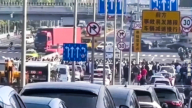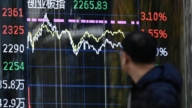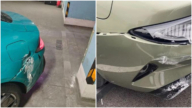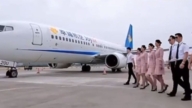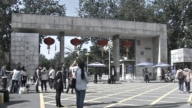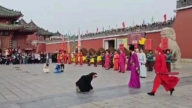【新唐人2011年10月4日訊】中國媒體報導,中國80%的正在建設中的鐵路項目已全部「緩建」,等待中國政府澄清高鐵政策的相關內容。同時,在信貸緊縮的大環境下,包括商業銀行在內的高鐵建設的資金提供者們,都在觀望著中國高鐵政策的下一步。業內人士分析,這將使鐵道部更加難以償還債務,還會波及許多供應商。
《21世紀經濟》報導,10月1號引述一位鐵道部的人士說,當前超過80%的在建鐵路項目,已經全線「緩建」,不少項目的完工時間被延後了一年。
這名消息人士說,鐵路項目緩建的原因都是因為建設資金未能及時到位。而三角債也是困擾中國鐵路建設的一大問題。他表示,幾乎所有的銀行都已經暫停向鐵路發放貸款。
中國鐵路工程師呂濤表示,由於鐵道部經濟責任不明晰,沒有人關心投資收益,在任期間,花越多的錢就能拿出政績,也可以得到巨額的回扣,在這樣的體制下,高鐵建設陷入資金困境一點也不奇怪。
中國鐵路工程師呂濤:「因為投資收益它根本不成比例,你不管是銀行貸款,債券還是上市,最後大家發現它是一個無底洞,所以大家也不能再跟進了。所以這次溫州的動車事故呢應該說把這一切都徹底的暴露出來了,同時呢也加速了資金的斷裂,所以鐵路高速投資已經無路可走了,也就造成了很多在建工程它被迫擱置。」
「7•23」甬溫線動車追尾事故,引發了外界對中國高鐵項目安全性的質疑,中共政府被迫叫停了所有新高鐵項目,下一步該如何走,還沒有一個定調。另外一位鐵道部內部人士的消息指出,事故後,中國與國外公司合作的境外高鐵建設項目,也已經全部暫停。
《華爾街日報》說,「7•23」事故發生後,鐵道部在國內債券市場的借款成本已大幅上升,而中國鐵道部現在還面臨高額的負債。據鐵道部數據顯示,2011年上半年主要財務及經營數據報告,截至今年6月底,鐵道部總負債達到2.09萬億元。
中國鐵路工程師呂濤:「萬億的高鐵投資並沒有真正解決中國鐵路客運的瓶頸問題。提高速度並解決不了買票難、乘車難的問題。而且有些線路因為採用動車組或者高鐵,取代了普通列車的車次,實際的運能還是下降了。巨額的鐵路投資呢,應該說沒有能快速的提高鐵路客運的運能,經濟收益也沒有明顯提高,這是一個決策性的失誤。」
呂濤表示,目前的「緩建」不止給鐵道部帶來還債的壓力,還會連鎖反映,殃及許多高鐵供應商。
中國鐵路工程師呂濤:「所有有關的這些供應商,應該說全部都為高鐵加大投入,也都是借款哪、欠款哪,然後期望上市,但是反過來鐵道部這一面它並沒有錢來支付這些供應商,很多都全部都拖欠著。但現在應該說走到頭了,高鐵的盲目建設現在已經被迫叫停了,這等於把很多一系列的企業都推到了破產的邊緣。」
消息人士說,等「7•23」事故的調查報告,以及鐵路安全大排查的調查報告公布之後,對高鐵後續發展的定調也會明晰。不過業內人士表示,由於政府各部門內部利益糾葛,估計調查會遇到很大的阻力和困難。
新唐人記者陳漢、尚燕、李若琳採訪報導。
80% Of High-speed Rail Projects Halted
Chinese media reported that 80% of China’s high-speed
railway projects under construction have been “postponed,"
waiting for the Chinese government to clarify policies
related to the high-speed rails.
Meanwhile, under the circumstance of credit squeeze,
the funds providers for high-speed railway construction,
including commercial banks, are waiting to see the next
policies of China’s high-speed rails.
Insiders point out, this will make more difficult for Railways
Ministry to repay debts and will affect many suppliers.
On October 1, “21st Century Economic Report" quoted
the words of a Ministry of Railways』 insider,
that over 80% of current railway projects under construction
are postponed, with their completion time delayed for a year.
According to the source, the reason for that
is the lack of money at this point in time.
Debt default is also a major problem in railway construction,
with almost all banks suspending loans for railway projects.
Lu Tao, a Chinese railway engineer, said the economic
responsibility of the Ministry of Railways is not clear,
thus nobody thinks of investment returns. Officials can show
performance and get big rebate from spending more money.
In this system, the financial difficulties encountered in
the construction of high-speed rails are not surprising.
Lu Tao: “Because the investment income is out
of proportion, whether it』s bank loans or market bonds,
we found it to be a bottomless pit in the end.
So people will not follow this up anymore.
Wenzhou』s train accident has exposed it thoroughly now.
At the same time it accelerated the rupture of funds.
So there is no way out for investment of high-speed railway.
It makes a lot of projects under construction to be set aside.”
The train accident of 7/23 Yongwen line led
to the security doubt of China』s high-speed rail projects.
Chinese government was forced to halt all new high-speed
rail projects. There is no decision for the next step.
Information by another Ministry of Railways insider
points out that after the accidents in China,
overseas high-speed rail projects between China
and foreign companies have all been halted.
Wall Street Journal reported that after the 7/ 23 accident,
the cost of borrowing money for Ministry of Railways
in the domestic bond market is going up substantially. And
the Railways Ministry is now confronted with high liabilities.
According to data from the Railways Ministry (Report
of main finance and operation in the first half of 2011),
at the end of June this year, the total liabilities
of the Ministry of Railways reached RMB2.09 trillion.
Lu Tao: “Trillions RMB of high-speed rail investment doesn』t
resolve transportation』 bottlenecks for China’s passengers.
Increasing the train speed can not resolve the difficulties
of buying tickets and using trains.
Actual transport capacity was decreased when motor train
units or high-speed rails replaced other trains in some lines.
The huge investment has not been able to increase
the transportation capacity for the railway passengers.
The economic benefits have not been significantly notable.
This is a decision-making error."
Lu Tao said the currently postponed construction
not only brings debt pressure on the Ministry of Railways,
but also leads to a chain reaction,
affecting a lot of high-speed rail suppliers.
Lu Tao: “All these suppliers have increased investments for
high-speed construction. They borrowed money, owe money
and expect to be listed. However, the Railways Ministry has
no money to pay these suppliers, many of whom defaulted.
It goes like that to the very end. The blind construction
of high-speed rails has been forced to halt now,
which means to push many companies
to the brink of bankruptcy. “
The source said that after releasing the 7/23 accident』
investigation reports and railway safety information,
the issue of the follow-up development of high-speed rails
will become more clear.
However, insiders estimate that the investigation
would encounter strong resistance and difficulties,
because of conflicting interests among various
departments and levels of government.
NTD reporters Chen Han, Shang Yan and Li Ruilin


